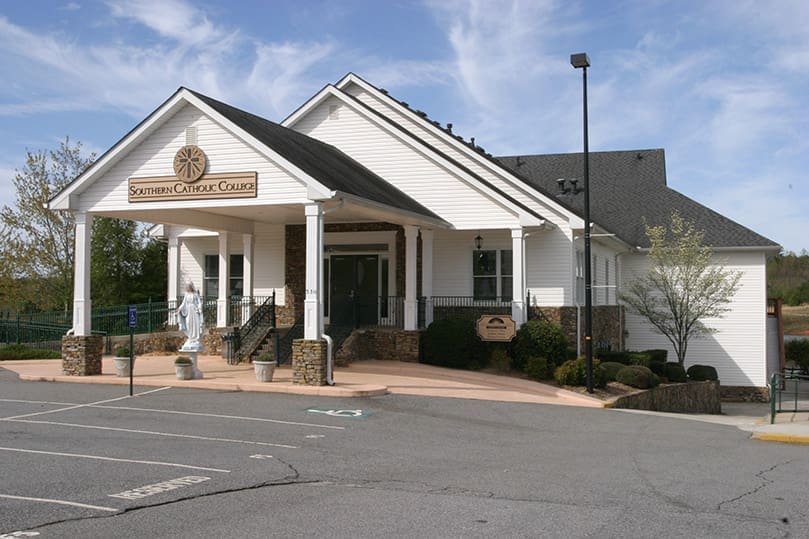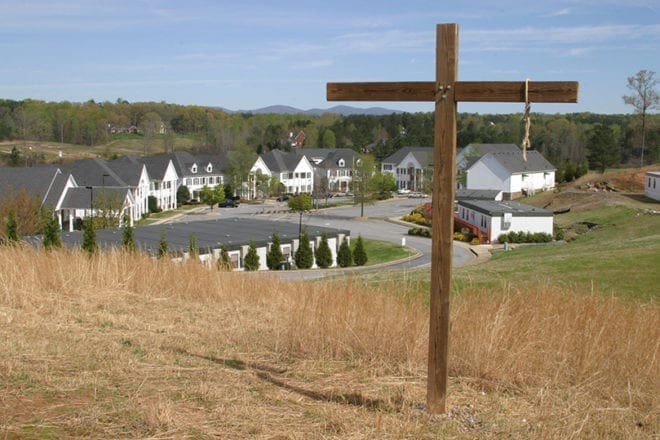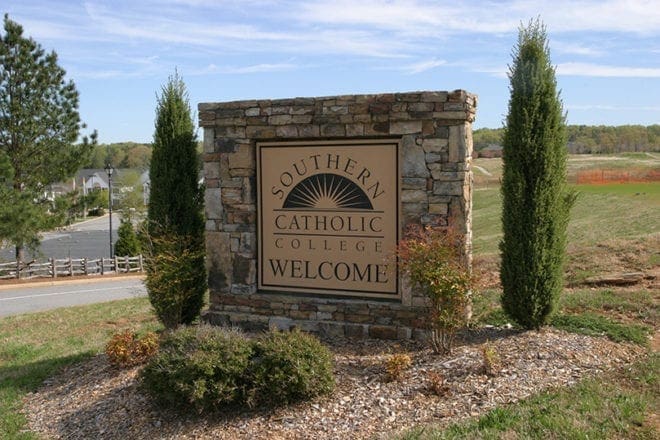 Photo By Michael Alexander
Photo By Michael AlexanderAtlanta
Southern Catholic Cuts Semester Short In Fund Crisis
By GRETCHEN KEISER and ANDREW NELSON, Staff Writers | Published April 15, 2010
The students, faculty and staff at Southern Catholic College in Dawsonville learned by e-mail over their spring break that their college year was ending early on April 15 because of a financial crisis at the college.
Whether the small Catholic college, which graduated its first senior class in 2009, will reopen at all is in the hands of the school’s board of trustees, said Legion of Christ Father Shawn Aaron, president of Southern Catholic College, in a telephone interview April 7.
He said a meeting of the board was tentatively scheduled for April 19.
Asked whether it was possible the college could financially reorganize and eventually reopen, Father Aaron said, “Those are exactly the decisions that the board has to make in light of the realities that we have. The board will have to assess that.”
“Financially we can’t make it to the end of the semester,” he said.
He said the college reached a crisis where they could not meet payroll beyond April 15. An appeal to a benefactor at the last minute, which did not lead to any new funding, caused him to hold back on the announcement and then it had to be done by e-mail, he said.
“Words cannot express how profoundly sorrowful I am at this situation,” he wrote.
The college, which was started by a group of North Georgia Catholic business people with a dream of establishing the state’s first residential Catholic college and one with an emphasis on orthodoxy, currently has about 170 students, 22 faculty members, some part time and some full time, and 25 staff members.

One of three crosses remains on a hill overlooking Southern Catholic College, Dawsonville, from its March 26 Living Stations of the Cross. Nearly 250 students, faculty and staff returned to the school on April 12 following spring break. A 10 a.m meeting with the school’s president, Legionaries of Christ Father Shawn Aaron, provided additional details following last week’s announcement that the college would end its semester April 15 instead May 13 due to lack of funds. Photo By Michael Alexander
Father Aaron scheduled a campus meeting April 12 with them and students’ parents to talk about transcripts, grades, graduation and issues relating to unemployment and health insurance.
Father Aaron, who was named president in the fall of 2009 after the Legion of Christ assumed responsibility for the previously privately run college, said he realized “from day one” as president that the college was in financial trouble.
He cited a number of reasons, including the economic downtown in the country. He also said that when Southern Catholic College opened, before it was accredited, scholarships were offered to attract students rather than students paying full tuition and room and board, which runs over $24,500 a year.
“When accreditation came … you were already in quicksand,” he said, even though accreditation allowed students to receive federal student loans and grants. “With the worsening economy, it became pretty obvious that it was unsustainable. It was going to take an infusion of a sizeable amount to get yourself out of that hole. …. That becomes a no-win situation over time. … You need more money coming in than you are spending.”
The fledgling college needed to transition from a “fund-raising model to a business model,” he said.
Father Aaron said that when the Legion of Christ came in last summer “they said they could not support the school.” The Legion provided a chaplain and was willing to help raise funds for Southern Catholic, he said.
Asked whether he would recommend to the board that the college be closed, Father Aaron said, “If it were up to me, I would keep it open. I see the potential of it, the lives it changes, the great teachers. But you can’t always run an institute judging by the heart. That call is not up to me.”
He said that he would recommend it stay open “if the board can come up with $6 million by June.”
The 22-member board includes a number of business people, the founding president of the college, seven Legion of Christ priests and Atlanta Archbishop Wilton D. Gregory and Auxiliary Bishop Luis Zarama, according to the college Web site.
In the e-mail to students, Father Aaron said that students would receive full credit for the spring semester even though the college is closing a month early and that they could stay on campus April 11 to 15 to say goodbye to friends, empty their rooms and gather information from academic, financial and student affairs’ offices.
“There will be a simple ceremony” for graduating seniors, Father Aaron said.
Students and Parents React
John Spann, who grew up in Americus, had planned to finish his studies in December with a history degree.
“I’d like my college degree to be from Southern Catholic. I have had a whole new life as a result of Southern Catholic,” said the 20-year-old. “We’re all really concerned if the doors are going to open again,” Spann said. “We are praying about it and hoping.”
When students learned the news, “it was quite a shock. We had no idea,” he said. Facebook “went crazy” with students bombarding each other with questions, he said.
Spann and other students face more time in college if they transfer and their college credits are not accepted at the new school. He said students generally believe few schools would accept Southern Catholic College credits except other small Catholic colleges. Graduate programs are known to accept students, but Spann said a friend transferred to a state college and had to start over as a freshman.
Spann said he was initially skeptical about the takeover of the college by the Legion of Christ. But he has been won over.
Spann said he has seen “good fruits” with the arrangement, more priests on campus, a consecrated woman available for discussions with students and an excellent college president in Father Aaron.
“I see him all the time,” Spann said.
Andrew Pudysz is graduating this spring but was worried about juniors, who may face tough choices about their college career.
“The juniors, having put in three years at the school, don’t really have anything to show for it. Once you’re a junior in college, you have pretty much decided to stick with the school. They have to start over at larger schools, or hope all of their credits transfer to small, private, liberal arts schools. My heart goes out to them the most. Plus, they are all really good students, really good friends,” said Pudysz in an e-mail.
Kristian Larsen, whose family attends St. Philip Benizi Church, Jonesboro, said students are looking forward but with sadness. “Sadness is the main emotion, but hope is there too,” said Larsen, who talked by telephone after the community meeting on Monday, April 12. “There are a lot of emotions. There is a lot of sadness. We are going to lose our community here,” said Larsen, the editor of the college newspaper.
Representatives from other Catholic colleges came to campus Monday to talk with students. Larsen said she is leaning toward going to Ava Maria University in Florida for her senior year because it looks like it would match her financial aid package, charge the same tuition and accept all her credits toward a dual major in English and theology.
“Southern Catholic College couldn’t have done a better job with helping out the students. They are really taking care of us. They haven’t given up on us.”
Joan Williams, who has two sons and a daughter enrolled at Southern Catholic College, said she was “shocked” and “puzzled” by the disclosure but not angry.
Williams, who said she is very active as a parent in campus life, said she was “totally surprised” the school had such serious financial issues.
Still, she said, “I have hope.”
“We’re there because of the faith formation, because of the wonderful professors they have,” Williams said. “For us, that is the saddest part.”
Students had just taken their midterms and were working on papers and projects, she said. They expected to have three more weeks of school and then finals. She wonders how grades will be determined, and if students’ GPAs will suffer as a result.
All three in her family have benefited from attending the college, Williams said, citing excellent teaching on the Catholic faith, close relationships with faculty members and a good group of peers, including students from around the country and a sizeable group of international students.
One of her sons, John Paul, spearheaded the start up of a campus coffeehouse where students perform every other Tuesday night and serve up specialty brews they’ve learned to make on a budget.
The 22-year-old junior, an English and theology major, said, “I am shocked and almost scared in a sense,” recognizing that his plans for the summer and then his senior year are gone. “That whole world has crumbled. … I feel this vulnerability,” John Paul said.
He wondered whether it would be possible to raise the money the school needs.

Southern Catholic College opened its doors to a class of 71 students from 15 states back on September 8, 2005. Last week faculty, staff and just over 200 students were informed that the Dawsonville school, which sits on 100 acres, will end its semester April 15 instead May 13 due to lack of funds. Photo By Michael Alexander
“On Facebook I’ve seen hopelessness. I have hope. Part of me says, you know what, miracles do happen,” he said. “I am optimistic and hopeful about it that somehow, someway, this will work out.”
He said friends always questioned why he went to the small new college when it wasn’t even accredited yet.
“I knew I needed to be somewhere where I would be a person and not a number,” he said. “Having a chance to jump start things, being on the ground floor. I was in the first four classes that opened. As much work as I have put into the campus, it has filled me up.”
Nancy Palmer, one of the early organizers of the college who is now on the staff at Pinecrest Academy in Cumming, said closure would be a loss for the Catholic community.
“I received the news with sadness and a sense of loss not only for the current students, but for the whole southeastern region of the U.S., which has very limited options in terms of an authentic Catholic secondary education,” she wrote by e-mail.
The school exceeded the organizers’ expectations and was a dream for many, she said. “We began planning the college in the conference room at St. Pius X High School where I was working at the time. I remember hanging the plans on the wall and one of the consultants telling me that, one day, we would be walking on that campus. It really was a dream come true.”
Her niece attends the college and “is very concerned about her alternatives going forward,” Palmer said.
“Southern Catholic struggled against increasingly insurmountable financial obstacles and in the end didn’t make it. I sincerely hope and pray that the story doesn’t end here.”
An examination of the school’s tax records with the Internal Revenue Service shows overspending outpaced the college’s revenue since students appeared on campus.
In 2007, it spent $2.5 million more than it took in. And the school’s assets shrunk year after year to make up for the shortfall. The college’s net assets in July 2005 were $7.2 million and in 2007, the most recent year on public record, the assets were $1.8 million, according to tax forms. Contributions to the school fell off in 2007 by close to 50 percent. Donors gave more than $3 million in 2005 and 2006. The contributions were $1.4 million in 2007 as the economy sputtered.
Dr. Paul Voss, provost of Holy Spirit College in Atlanta, said all nonprofits “are hurting” in this economy and small private colleges in particular are struggling because Georgia’s HOPE Scholarship program makes excellent public colleges a bargain for families trying to pay for college education.
“It is an unbelievably difficult economic time right now,” he said. “I feel very, very badly for the students and the faculty and the people that put their time, talent and treasure into the (Southern Catholic College) program. I have nothing but the greatest respect and admiration for them.”
Businessman Tom Clements had the vision to start a Catholic college here. And for a number of years, he was the public face of the grassroots effort. He continues to be a leader on campus from his seat on the college’s board of fellows. Two of his children attended the school; one graduated in December, the other is scheduled to receive a diploma this spring. Everybody tried with good intentions to help the school to succeed, he said. It is a sad decision, he said.
The small size of the student body was a factor in the financial instability, he said. The school needed about 500 students to succeed but only got about 250, he said.
Clements said the school faces a difficult financial situation.
“We burned through a lot of our money, but we never got to the stage to be sustainable,” he said. The college would need to come up with $6 million to help its long-term sustainability, he said.
“If you can raise $3 million in a short period, we’ll open in the fall,” he said.
His “dream” would be for a benefactor to step forward and see the value of the college.